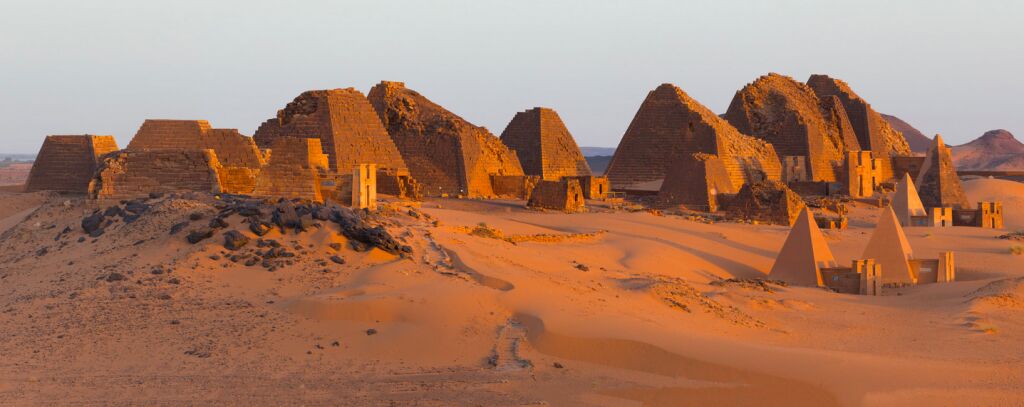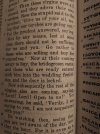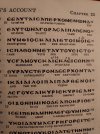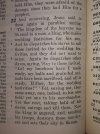How Moses married his Ethiopian wife is covered by Josephus in the Antiquities of the Jews, book 2, chapter 10. This is during the first 40 years of Moses' life, while he was still in the court of Pharoah. Basically, Moses ended up being the general of the Egyptian army in a war against Ethiopia. Moses took the King of Ethiopia's daughter as a wife at the end of the war.
In the next chapter Josephus records how Moses fled to Midian and took an entirely separate wife there as per the Biblical account. These are two completely separate women.
Note also that Midian was located to the east of the Gulf of Aqaba - in what is now Saudi Arabia. While Ethiopia was in the direction that Ethiopia is today, but not as far away as @NickF's map as what is now Sudan was historically Ethiopia. But still, they are on opposite sides of the Red Sea and in completely different directions from Egypt. There is absolutely zero chance that anybody in scripture would have had the slightest confusion between the two countries, they are completely different parts of the world. These cannot be the same woman.
Josephus' account of both marriages and their circumstances (Antiquities of the Jews, book 2, chapter 10-11):
In the next chapter Josephus records how Moses fled to Midian and took an entirely separate wife there as per the Biblical account. These are two completely separate women.
Note also that Midian was located to the east of the Gulf of Aqaba - in what is now Saudi Arabia. While Ethiopia was in the direction that Ethiopia is today, but not as far away as @NickF's map as what is now Sudan was historically Ethiopia. But still, they are on opposite sides of the Red Sea and in completely different directions from Egypt. There is absolutely zero chance that anybody in scripture would have had the slightest confusion between the two countries, they are completely different parts of the world. These cannot be the same woman.
Josephus' account of both marriages and their circumstances (Antiquities of the Jews, book 2, chapter 10-11):
Chapter 10.
How Moses made war with the Ethiopians.
1. [About An. 1582] Moses therefore, when he was born, and brought up in the foregoing manner, and came to the age of maturity, made his virtue manifest to the Egyptians; and shewed that he was born for the bringing them down and raising the Israelites. And the occasion he laid hold om was this; the Ethiopians, who are next neighbours to the Egyptians, made an inrode into their countrey, which they seized upon, and carried off the effects of the Egyptians: who, in their rage, fought against them, and revenged the affronts they had received from them: but being overcome in battel, some of them were slain, and the rest ran away in a shameful manner, and by that means saved themselves. Whereupon the Ethiopians followed after them in the pursuit, and thinking that it would be a mark of cowardice if they did not subdue all Egypt, they went on to subdue the rest with greater vehemence: and when they had tasted the sweets of the countrey, they never left off the prosecution of the war. And as the nearest parts had not courage enough at first to fight with them, they proceeded as far as Memphis, and the sea it self: while not one of the cities were able to oppose them. The Egyptians, under this sad oppression, betook themselves to their oracles and prophecies; and when God had given them this counsel, to make use of Moses the Hebrew, and take his assistance: the King commanded his daughter to produce him, that he might be the General of their army. Upon which, when she had made him swear he would do him no harm, she delivered him to the King, and supposed his assistance would be of great advantage to them. She withal reproached the Priest, who when they had before admonished the Egyptians to kill him, were not ashamed now to own their want of his help.
2. So Moses, at the persuasion both of Thermuthis and the King himself, cheerfully undertook the business. (27) And the sacred Scribes of both nations were glad. Those of the Egyptians, that they should at once overcome their enemies by his valour and that by the same piece of management Moses would be slain. But those of the Hebrews, that they should escape from the Egyptians, because Moses was to be their General. But Moses prevented the enemies, and took and led his army before those enemies were apprized of his attacking them. For he did not march by the river, but by land; where he gave a wonderful demonstration of his sagacity. For when the ground was difficult to be passed over, because of the multitude of serpents, which it produces in vast numbers; and indeed is singular in some of those productions, which other countries do not breed; and yet such as are worse than others in power and mischief, and an unusual fierceness of sight: some of which ascend out of the ground unseen, and also fly in the air, and so come upon men at unawares, and do them a mischief; Moses invented a wonderful stratagem to preserve the army safe, and without hurt. For he made baskets, like unto arks of sedge, and filled them with Ibes, (28) and carried them along with them: which animal is the greatest enemy to serpents imaginable; for they fly from them, when they come near them, and as they fly they are caught and devoured by them; as if it were done by the harts. But the Ibes are tame creatures, and only enemies to the serpentine kind. But about these Ibes I say no more at present, since the Greeks are not themselves unacquainted with this sort of bird. As soon therefore as Moses was come to the land which was the breeder of these serpents, he let loose the Ibes; and by their means repelled the serpentine kind, and used them for his assistants before the army came upon that ground. When he had therefore proceeded thus on his journey, he came upon the Ethiopians, before they expected him; and joining battel with them, he beat them, and deprived them of the hopes they had of success against the Egyptians: and went on in overthrowing their cities, and indeed made a great slaughter of these Ethiopians. Now when the Egyptian army had once tasted of this prosperous success, by the means of Moses, they did not slacken their diligence; insomuch that the Ethiopians were in danger of being reduced to slavery, and all sorts of destruction. And at length they retired to Saba, which was a royal city of Ethiopia, which Cambyses afterwards named Meroe, after the name of his own sister. The place was to be besieged with very great difficulty, since it was both incompassed by the Nile quite round; and the other rivers Astapus and Astaboras made it a very difficult thing for such as attempted to pass over them. For the city was situate in a retired place, and was inhabited after the manner of an island; being incompassed with a strong wall, and having the rivers to guard them from their enemies; and having great ramparts between the wall and the rivers; insomuch, that when the waters come with the greatest violence it can never be drowned: which ramparts make it next to impossible for, even such as are gotten over the rivers, to take the city. However, while Moses was uneasy at the army’s lying idle, (for the enemies durst not come to a battel,) this accident happened; Tharbis was the daughter of the King of the Ethiopians: she happened to see Moses, as he led the army near to the walls, and fought with great courage: and admiring the subtilty of his undertakings, and believing him to be the author of the Egyptian success, when they had before despaired of recovering their liberty; and to be the occasion of the great danger the Ethiopians were in, when they had before boasted of their great atchievements, she fell deeply in love with him: and upon the prevalency of that passion, sent to him the most faithful of all her servants to discourse with him upon their marriage. He thereupon accepted the offer, on condition she would procure the delivering up of the city; and gave her the assurance of an oath to take her to his wife: and that when he had once taken possession of the city he would not break his oath to her. No sooner was the agreement made, but it took effect immediately: and when Moses had cut off the Ethiopians, he gave thanks to God, and consummated his marriage, and led the Egyptians back to their own land.
Chapter 11.
How Moses fled out of Egypt, unto Midian.
1. [About An. 1582] Now the Egyptians, after they had been preserved by Moses, entertained an hatred to him; and were very eager in compassing their designs against him: as suspecting that he would take occasion, from his good success, to raise a sedition, and bring innovations into Egypt; and told the King, he ought to be slain. The King had also some intentions of himself to the same purpose: and this as well out of envy at his glorious expedition at the head of his army, as out of fear of being brought low by him: and, being instigated by the sacred Scribes, he was ready to undertake to kill Moses. But when he had learned beforehand what plots there were against him, he went away privately; and because the publick roads were watched, he took his flight through the deserts, and where his enemies could not suspect he would travel: and though he was destitute of food, he went on, and despised that difficulty couragiously. And when he came to the city of Midian, which lay upon the Red Sea, and was so denominated from one of Abraham’s sons by Keturah; he sat upon a certain well, and rested himself there after his laborious journey, and the affliction he had been in. It was not far from the city: and the time of the day was noon. Where he had an occasion offered him, by the custom of the countrey, of doing what recommended his virtue, and afforded him an opportunity of bettering his circumstances.
2. For that country having but little water, the shepherds used to seize on the wells before others came; lest their flocks should want water; and lest it should be spent by others before they came. There were now come therefore to this well, seven sisters, that were virgins, the daughters of Raguel a Priest; and one thought worthy by the people of the country of great honour: these virgins, who took care of their father’s flocks; which sort of work it was customary, and very familiar for women to do in the countrey of the Troglodytes: they came first of all, and drew water out of the well in a quantity sufficient for their flocks, into troughs; which were made for the reception of that water. But when the shepherds came upon the maidens, and drove them away, that they might have the command of the waters themselves, Moses, thinking it would be a terrible reproach upon him if he overlooked the young women under unjust oppression; and should suffer the violence of the men to prevail over the right of the maidens, he drove away the men, who had a mind to more than their share; and afforded a proper assistance to the women: who when they had received such a benefit from him, came to their father, and told him, how they had been affronted by the shepherds, and assisted by a stranger; and intreated that he would not let this generous action be done in vain, nor go without a reward. Now the father took it well from his daughters that they were so desirous to reward their benefactor; and bid them bring Moses into his presence, that he might be rewarded as he deserved. And when Moses came, he told him what testimony his daughters bare to him, that he had assisted them; and that, as he admired him for his virtue, he said, that Moses had bestowed such his assistance on persons not insensible of benefits, but where they were both able and willing to return the kindness, and even to exceed the measure of his generosity; so he made him his son, and gave him one of his daughters in marriage; and appointed him to be the guardian and superintendent over his cattel: for of old all the wealth of the barbarians was in those cattel.
Last edited:






